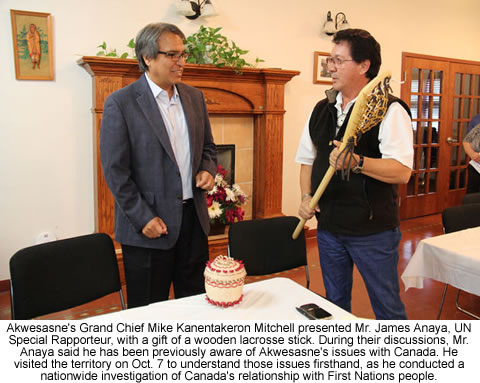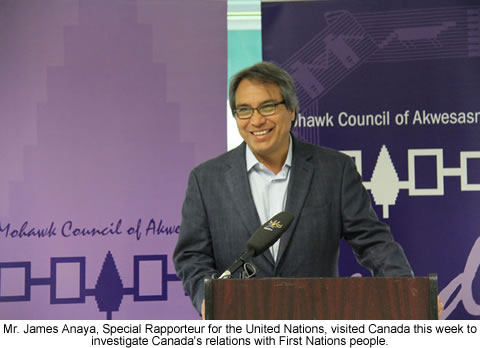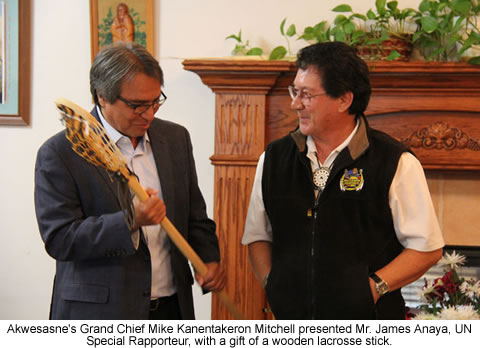 |
Canku Ota
|
 |
|
(Many Paths)
|
||
|
An Online Newsletter
Celebrating Native America
|
||
|
NOVEMber 2013 - Volume
11 Number 11
|
||
|
|
||
|
UN Special Rapporteur
Conducts Research On Canada's Relations With First Nations People
|
||
|
by Indian Time staff
|
||
|
credits: photos courtesy
of MCA.
|
|
Akwesasne First Stop in Cross-Country Investigation
"Mr. Anaya's last-minute decision to visit Akwesasne was a pleasant surprise," said Grand Chief Mike Kanentakeron Mitchell, who had been planning to present to the Special Rapporteur at a scheduled hearing in Ottawa. "His eagerness to learn about Akwesasne's situation as a border community provided us with the golden opportunity to acquaint him with the daily complexities of Akwesasne life, and the issues we have faced with the federal government." "The Mohawk people and Akwesasne community are famous around the world," said Mr. Anaya during a hearing planned at the A'nowara'kowa Arena on Kawehno:ke (Cornwall Island.) "This is the first community I'm visiting during my nine day stay in Canada and this is a place I've heard a lot about over the years." Mr. Anaya said the United Nations requested permission from Canada to conduct the research and report. On Oct. 15, Mr. Anaya held a special conference describing his initial findings, and a detailed report will be forthcoming in the months ahead. "I'm hoping that by raising these issues with the Canadian government, by including them in my report, and making appropriate recommendations, that I will be able to draw further attention to these issues so that you can move toward resolution of them," Mr. Anaya said, addressing a group of Mohawk elders in a follow-up meeting at the Tri-District Elders Lodge on Kawehno:ke.
"Why do we face scrutiny [at the Canadian Port of Entry] when proudly declaring our membership to the Kanienkehaka Nation?" asked Francis-Herne, representing the Akwesasne youth. "Why do we feel singled out and profiled, sometimes being made to feel criminal? And why is it so hard for us to travel from one part of our community to another? It is not about having special rights, it is about having human rights." Council lawyer Micha Menczer pointed out how it's Akwesasne community members trying to live their daily lives who are suffering. The Mohawks, he said, are not asking for anything special, they are simply asking to go about their lives without having their rights violated daily. "Resolution is possible but Akwesasne must have their rights respected and a willing Canadian government partner to negotiate practical arrangements for daily travel in the community across the international border. This has not been the case to date." The Canadian government has a constitutional obligation to consult with First Nations before creating regulations or policies that impact their aboriginal rights or title. Canada has failed to consult with Akwesasne or accommodate the Aboriginal rights of Akwesasne members on a number of large issues. This has resulted in undue hardship to the community members. The Canada Border Services Agency ("CBSA") and Canada did not consult with Akwesasne before deciding to arm border guards with guns on Akwesasne Territory. CBSA did not consult Akwesasne before closing down a border crossing and requiring that residents of Akwesasne leave Akwesasne to report to Canadian officials as part of their everyday routine life. The Federal Bridge Corporation and Seaway International Bridge Corporation did not consult with Akwesasne before relocating the toll plaza on Cornwall Island to Cornwall. The resulting change of the duty to report from Cornwall Island to Cornwall has severely hampered the ability of community members to go about their daily lives. The Mohawk people cannot travel to school, work, sporting events, doctor's appointments, cultural workshops, birthday parties, or conduct any of their daily business without encountering lengthy delays in first leaving Akwesasne, to report to the Canadian government, and then returning to Akwesasne. Akwesasne's proposal to have alternate reporting arrangements (common in other parts of the country) implemented in Akwesasne has not been accepted by Canada. In the words of many community members: "We feel like hostages in our own lands." Community members who do not abide by the reporting requirement are punished by having their car seized and a minimum $1,000 fine applied. This has been called Canada's retaliation against the Mohawk people for their refusal to allow guns on the territory. Mohawk Council currently has several cases against CBSA before the Canadian Human Rights Commission based on the unfair Duty to Report, a lack of accommodation to emergency services utilizing the bridge crossing at Akwesasne, and a failure of CBSA to recognize tribal identification, Haudenosaunee passports and other identification that allows Mohawks to identify themselves as Mohawks rather than as Canadian or American citizens.
"Mr. Anaya's visit comes at a time when Canada and First Nations people are realizing the tensions that exist," said Grand Chief Mitchell. "For years, Canada has tried to keep Indigenous issues tied up in its bureaucracy and red tape. On many occasions the Canadian courts have reminded the federal government that it's best to negotiate a solution rather than expect the Canadian courts to interpret Indigenous rights, then have the government fail to execute them." |
|
|
||
|
|
||
| Canku Ota is a free Newsletter celebrating Native America, its traditions and accomplishments . We do not provide subscriber or visitor names to anyone. Some articles presented in Canku Ota may contain copyright material. We have received appropriate permissions for republishing any articles. Material appearing here is distributed without profit or monetary gain to those who have expressed an interest. This is in accordance with Title 17 U.S.C. Section 107. | ||
|
Canku Ota is a copyright ©
2000 - 2013 of Vicki Williams Barry and Paul Barry.
|
||
 |
 |
|
|
The "Canku
Ota - A Newsletter Celebrating Native America" web site and
its design is the
|
||
|
Copyright ©
1999 - 2013 of Paul C. Barry.
|
||
|
All Rights Reserved.
|
||
 (October
16, 2013) TERRITORY OF AKWESASNE – United Nations Special Rapporteur
James Anaya visited Canada this week on a special assignment, conducting
hearings across the country to examine the relationship between
the government of Canada and First Nations people. Mr. Anaya made
Akwesasne his first stop on Oct. 7, hearing presentations from community
officials on Akwesasne's experiences with the Canadian government.
(October
16, 2013) TERRITORY OF AKWESASNE – United Nations Special Rapporteur
James Anaya visited Canada this week on a special assignment, conducting
hearings across the country to examine the relationship between
the government of Canada and First Nations people. Mr. Anaya made
Akwesasne his first stop on Oct. 7, hearing presentations from community
officials on Akwesasne's experiences with the Canadian government. During
the hearing, Mr. Anaya heard from Grand Chief Mitchell, Chief Brian
David, Justice Director Joyce King, youth representative Shara Francis-Herne
and Akwesasne's legal counsel Micha Menczer on Canada's violations
of the aboriginal, civil and human rights of the Mohawks of Akwesasne.
During
the hearing, Mr. Anaya heard from Grand Chief Mitchell, Chief Brian
David, Justice Director Joyce King, youth representative Shara Francis-Herne
and Akwesasne's legal counsel Micha Menczer on Canada's violations
of the aboriginal, civil and human rights of the Mohawks of Akwesasne. Canada's
injustices against Akwesasne aren't limited to the bridge and border
crossing issues. Canada has failed to uphold their legal obligation
to consult with and accommodate the rights of the Mohawks of Akwesasne
in many other areas. This is seen in the enactment of several Bills
that significantly impact First Nations people. Those bills are
in relation to safe drinking water, marriage and property laws,
and education. If Canada is unwilling to consult with First Nations
before passing legislation that immediately affects them, then the
Federal Government should at the very least be incorporating clauses
that allow time and opportunity for First Nations to develop their
own legislation to regulate their own water, property, and education
laws.
Canada's
injustices against Akwesasne aren't limited to the bridge and border
crossing issues. Canada has failed to uphold their legal obligation
to consult with and accommodate the rights of the Mohawks of Akwesasne
in many other areas. This is seen in the enactment of several Bills
that significantly impact First Nations people. Those bills are
in relation to safe drinking water, marriage and property laws,
and education. If Canada is unwilling to consult with First Nations
before passing legislation that immediately affects them, then the
Federal Government should at the very least be incorporating clauses
that allow time and opportunity for First Nations to develop their
own legislation to regulate their own water, property, and education
laws.